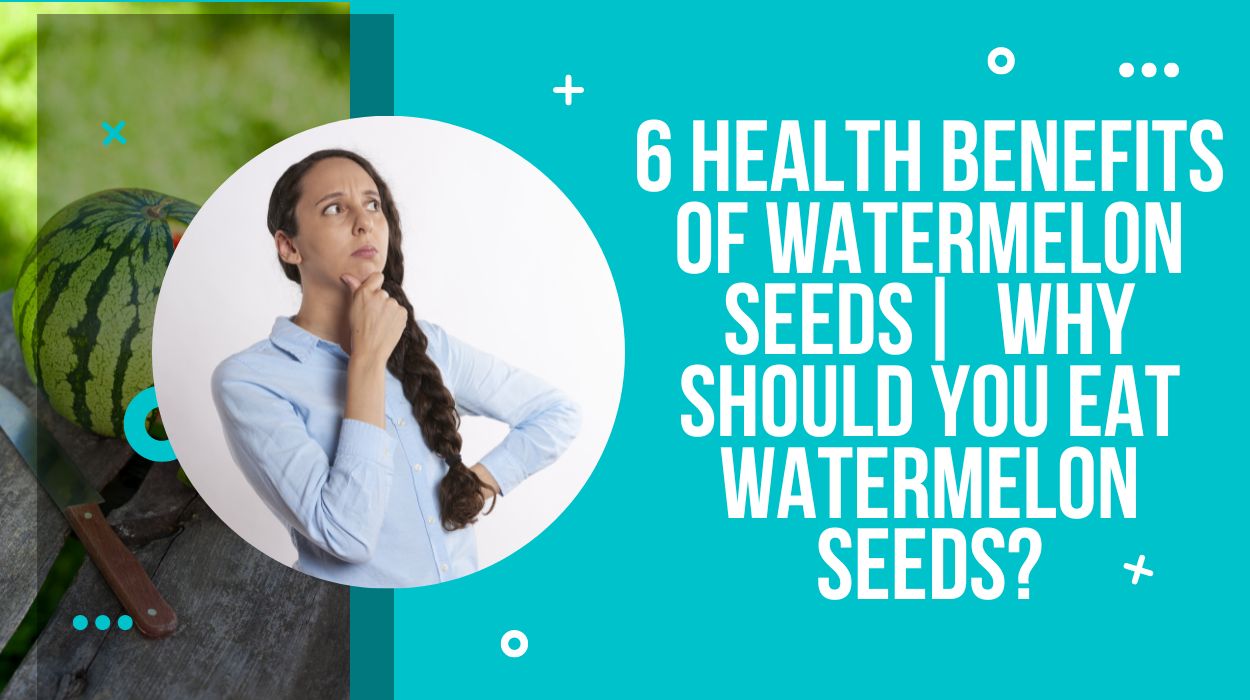Who doesn’t like a red, mellow watermelon? Who doesn’t relish the sweet juice that it releases in your mouth and quenches your thirst on hot summer afternoons? Not anyone we know!
But what if we told you there’s more to Watermelons than just their juice, pulp, and sweetness? It’s their seeds!
Watermelon seeds have more purpose than for you to discard them into your waste bin. They are beneficial and provide a variety of health benefits. A rich source of nutrition, you need to consider including these in your diet.
But if a watermelon grows inside my stomach?!
Now, for those wondering if it’s safe to eat watermelon seeds. Yes, absolutely! It is not just safe but also highly recommended. Watermelon seeds do not spurt in your stomach and birth a baby watermelon. Instead, they pretty much pass through your entire digestive system without being digested. Are you surprised? We know.
Here, we will enumerate all the fantastic benefits of watermelon seeds and give you reasons not to throw them away.
We will start with listing the nutritional value of Watermelon seeds that you can refer to as you reading further.
Nutritional Value of Watermelon seeds per 100g
| Watermelon seeds | Nutritional Value per 100g |
| Calories | 557 |
| Total Fat | 47 g |
| Saturated Fat | 9.8 g |
| Total Carbohydrate | 15 g |
| Protein | 28 g |
| Calcium | 54.00 mg |
| Iron | 7.28 mg |
| Potassium | 648 mg |
| Magnesium | 515 mg |
| Zinc | 10.24 mg |
Health Benefits of Watermelon seeds
Watermelon seeds Control blood sugar:

Watermelon seeds are known to help with type 2 diabetes. These seeds reduce the insulin resistance of your body. Insulin is a hormone released by the Islets of Langerhans in your pancreas, responsible for controlling the amount of glucose in your blood. It regulates the release of glucose to ensure a balanced level of blood sugar. When your body starts showing insulin resistance, you develop type 2 diabetes.
While you cannot enjoy watermelon if you have diabetes due to its high sugar levels, watermelon seeds are beneficial. They help in reducing the resistance that your body has developed towards insulin. Naturally, insulin works better due to this and gains better control of your sugar levels. One should beware, though, to not eat too many watermelon seeds in a day due to their high-calorie content since the risk of obesity increases with diabetes.
Source: https://www.researchgate.net/publication/285720720
Watermelon seeds prevent osteoporosis
Osteoporosis is a condition of weakening of bones. Here, old bones perish, but new ones aren’t able to form in their place. It is one of the conditions of old age which troubles many.
With a calcium content of about 54 mg, watermelon seeds are highly beneficial in preventing bone damage and promoting bone regeneration. Their magnesium content is even higher, with about 515 mg per 100 g. With this magnesium, copper, and manganese, watermelon seeds make you less prone to develop a fracture in case of accidents. It also significantly helps prior cases of osteoporosis by giving you healthier and stronger bones.
Source: https://www.webmd.com/osteoporosis/ss/slideshow-superfoods-for-your-bones
Watermelon seeds Ensure healthy hair
Watermelon seeds are rich in proteins with 28 g per 100 g. Since hair is primarily just strands of Keratin protein, protein is an essential requirement for their growth, health, and strength.
The high content of iron in Cashew nuts helps the blood circulation to your scalp. This circulation of blood also improves oxygen supply to your hair follicles, from which hair grows.
A high amount of magnesium in watermelon seeds – 515 mg per 100 grams – ensures that your scalp is safe from calcium build-up. This build-up is known to clog your hair follicles and restrict hair growth. In severe conditions, it may even lead to hair loss. Magnesium works to slow down calcium production on your scalp and allows your hair follicles to breathe better. It also prevents hair breakage by strengthening your hair. Thus, it improves the overall health of your hair by working on its roots.
There’s about 10.24 mg of zinc in 100 g of Watermelon seeds. Zinc is vital to help with the repair of your hair. They also ensure the proper functioning of the oil glands on your scalp to ensure your hair receives an adequate amount of moisture and keeps your hair healthy and growing.
Watermelon seeds Benefit your skin
Again, the high magnesium content of Watermelon seeds proves to be extremely useful in maintaining healthy and good-looking skin. You can also get clean skin by letting your Watermelon seeds sprout. Sprouting increases the vitamin C in the seeds. They also control acne and dullness. Using Watermelon seeds helps you fight premature aging of the skin due to the presence of zinc. It also contains eczema. It fights excessive dryness of the skin by replenishing the necessary moisture.
Watermelon seed Boosts immunity

The rich nutritional level of Watermelon seeds aid in enhancing your immunity. It contains iron which is essential to ensure the proper working of the immune system. Iron is responsible for protection against pathogens. A good intake of iron also safeguards you from developing Anemia caused due to iron-deficiency in the blood.
Watermelon seed Enhances energy levels
As you must’ve noticed in the list of nutritional values we presented initially; watermelon seeds are full of calories. These calories are primarily the result of healthy fatty acids present in the Watermelon seeds. The high calorie levels ensure you a significant boost of energy throughout the day. They make you less prone to fatigue and significantly improve your day-to-day functioning. Despite the numerous benefits of the calorie count, you must be careful how much you consume watermelon seeds. Too high a consumption can lead to obesity.
How to consume Watermelon seeds
Now that we have discussed all the significant health benefits of watermelon seeds let us look at how you can consume them.
- Sprouting is by far the best way you can consume watermelon seeds.
- This process involves soaking the seeds in water until they sprout and then drying them. Watermelon seeds are most nutritious when you sprout them.
- You can also eat watermelon seeds by roasting them. Add a little bit of salt and olive oil to the seeds and bake them for 10-15 minutes. This process won’t break the shell of the seeds, so you can crack them open and enjoy a healthy snack.
Is it harmful to eat watermelon seeds right off the fruit?
No, it is not. But it won’t be beneficial either because all the nutrients are present inside the seed, which remains closed off behind the shell.
We hope you remember us when you have watermelon next time, and don’t throw away its seeds!


